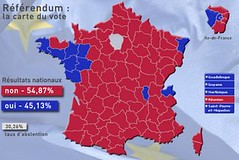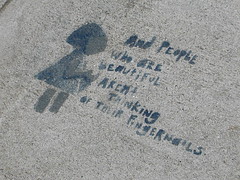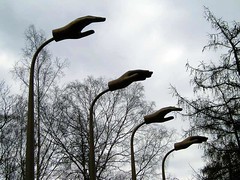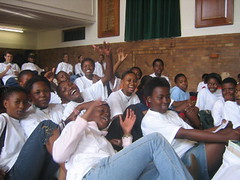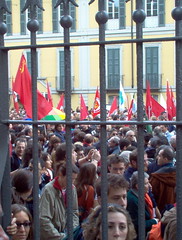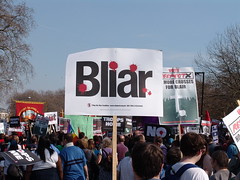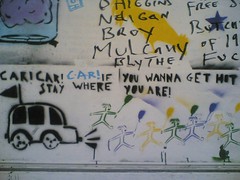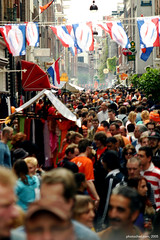I have had two questions lately about the pictures in my blog. An Austrian friend of mine said that she was impressed by the photos I have taken although she doesn´t always understand the connection to the text.
The latter is not really my problem but when it comes to the former, I have a confession to make: I did not take the photos. They are not my own.
All the photos are from Flickr which is a website where people upload their pictures and then you can use them on a Creative Commons basis. I find it absolutely remarkable and will start uploading pics when I finally buy a digital camera any day soon.
I was explaining this to a colleague of mine and he asked:"So why would someone let others use their photos?" Here we see a classic example of the differences in thinking. Things such as Creative Commons and Flickr are based on another way of thinking:"Why shouldn´t others have a chance to use my pics if they just tell they´re mine."
(Oh and by the way: In Dutch flicker is a faggot. The name of the website shocked a few of my colleagues)
Tuesday, May 31, 2005
Secret of my pictures
Monday, May 30, 2005
Where´s the catastrophy now?
Well, there is only one issue a person who works in a European organisation can write about today. I mean the NON of yesterday.
The Dutch will vote on Wednesday and they will probably reject the constitution as well.
I don´t really know what to think about this. I don´t feel disappointed. I don´t know how. I even feel a slight of guilt for handling this in a such cool and calm manner.
I would have of course voted yes because I feel that the constitution clarifies things. But then again, I have to admit: I have not read it. And for heaven´s sake, I graduated from Political Science. If a person who calls reading the biography of Blair leisure time does not even bother opening the booklet, who does?
I have taken the constitution as something of a technical matter. Of course it brings in some changes but then again, the best thing it does is compiling the various treaties into one document.
Politicians across Europe have been saying that it is a catastrophy if the people vote no. But I have not understood where the catastrophy is. And to be honest: I think there is a problem in a system that you have a referendum but say that there is only one right solution. Of course this causes a backlash.
If the constitution is not accepted and the European Union still keeps functioning more or less ok, how will they explain this then? On moments like these I truly feel that it was a good move to appoint a Commissioner who is responsible for the image of the Union.
Do accept my apologies if this sounds like besserwissering.
Friday, May 27, 2005
Tolerating imperfection
I attended a brilliant brainstorming discussion on Wednesday. The topic was globalisation, nationalism and immigration. The event was part of the citizenship programme that is funded by the Finnish government. Absolutely amazing discussion about inclusive and exclusive identities. This is what I call intelligent gymnastics.
I think I have written previously in this blog about the fact that Dutch people are not used to people who pronounce Dutch words incorrectly. I realised during the discussion that our two nations have hugely in common. Finns usually do not get it when someone tries to pronounce words like Jäätteenmäki, Korkeavuorenkatu, Ahtisaari, polkupyörä or even Lappeenranta. I had problems in the beginning with words like Rozengracht, Schuytstraat, van Gogh or Spui.
In Finland it is easy to find a reason: we don´t really have immigrants so there are no people who would make us come to terms with imperfection. But this can not be the reason for the Dutch. Hmm..I wonder if someone else can explain this.
Thursday, May 19, 2005
A different approach
I had a discussion once with a professor of mine whether feminism is a relevant topic in political science or not. If I would choose, I would do it in a way like at Tampere University where feminist approach to politics is a compulsory course.
An interesting example of how gender gives a different perspective on the world is Women´s eNews. I would especially recommend checking their list of Leaders of the 21st century.
Wednesday, May 18, 2005
He is still with us
I opened my laptop, made a playlist consisting of Antony and the Johnsons and Nouvelle Vague, changed into home clothing and started reading comics.
Before moving to Amsterdam my two good friends Maria and Johanna gave my Matti Hagelberg´s comic book Kekkonen. It took me this long to read it. It is absolutely hilarious. For those who do not know, Urho Kaleva Kekkonen was Finland´s president from the 1950´s to 1980´s. Hagelberg makes an ironic statement of the exaggerated role Kekkonen had in Finnish society also long after his death. In the comic book Kekkonen meets Elvis, saves the world, takes care of the physical health of Finns etc. Unfortunately it is available only in Finnish. But if you´re able to understand our obscure language, rush to the bookstore.
I do not really belong to the Kekkonen-generation. My parents do. I remember him as this stumbling old guy on tv. But I also remember my aunt Arja saying once that for long she thought that Kekkonen is a synonym for president. And she surely was not the only Finn to have that feeling.
What a weird country I come from.
(The picture is the Urho Kekkonen monument in Helsinki. I think it is brilliant, his huge hands still protecting the nation.)
Tuesday, May 17, 2005
End of transmission?
It was truly interesting. He defended with convincing arguments the role of public broadcasting. He said that the diversity of languages in Europe is one of the key reasons why public broadcasting is needed and traditionally a huge part of television on this continent. Wessberg said:"Otherwise who would ever fund tv fiction in Icelandic."
I have always been a strong supporter of public broadcasting although I am not sure whether the current fee system is a wise one. If I would decide, I would fund public broadcasting directly from taxes. At the moment the fees are only paid by the ones who can afford them.
However I join the people saying that public broadcasters need to redefine their role. In that sense the decision of the BBC to go public with their archives is a move to the right direction and and legitimises the system.
Saturday, May 14, 2005
Is this just mental masturbation?
I love words, which may be yesterday's news for the people who know me. For me it has always been a brilliant feeling when I learn a new word.
During an interview today an Austrian friend of mine Angelika used an absolutely fab phrase: mental masturbation. She used it when talking about the problems when trying to explain complex and abstract higher education policies in a manner that they would somehow touch the reality of the people working on the local level. She said that this needs to be done so that the work in ESIB is not only mental masturbation for her.
I like the word but I like the thinking behind it even more. It reminded me of writing this blog. What is the reason for doing this? Who benefits from this? Or is it only...yes...mental masturbation for myself? Have to ponder that.
Thursday, May 12, 2005
New imperfect animals
I have been preaching in this blog about participatory democracy and the need for dialogue. Now I shall look at the other end of the scale. I mean the politicians.
Political animal is a common nickname for a politician. It communicates rather clearly how we see our politicians. We seem to think that they are living in a parallel universe.
There is of course some truth in that. I noticed it when I was active in the student movement that my language started changing when I interacted a lot with civil servants and MPs. I said challenges, not problems. I stressed the need for a critical evaluation when I did not like something. Really scary stuff. It has been a learning process to get back on the other side.
But still, I would not blame the people in politics. I blame us, the people. We have let this happen. We have elected these people. Or often we have let other people elect these kind of people. We need to sharpen up. We need to change the political animals to another species. The species we belong to. This is a task for NGOs, individual citizens and political journalists. We need to ask for better answers to our questions.
The state we are has a lot to do with our exaggerated expectations. We allow our friends to be imperfect and even annoying but the same does not apply to politicians. We need to humanise politics. At the present culture we are giving incentives for people in politics to play it safe. And whenever someone makes a mistake, we form a choir and shout:"You are the Weakest Link. Goodbye!" If we would allow politicians to stumble a bit, to guess, to show some insecurity, we would also make it easier to step into politics. And to be very clear: I don´t mean cheating, I mean imperfection.
p.s. I said at one point that I do not mind if people read my blog. Still, I would encourage you to comment. Especially if you disagree. Although fan clubs are also allowed.
Tuesday, May 10, 2005
Trusting us works
In a recent essay he co-authored for Demos he suggests an Open Commission for Accuracy in the Media (OCAM) that would report on complaints and rulings on media.
My first reaction was slightly negative. Oh my goodness, it was Orwell, 1984 and strict government control again. But Mulgan and Co. go the other way. They suggest that governments should try to learn from the open source movement and let the people guide other people. They come up with an idea that there should be a website that would operate like eBay where readers, viewers and listeners could rate media on accuracy, honesty and usefulness.
I really like the idea. It is a combination of participatory democracy, investments in media literacy and building of trust in society. It would be a signal that our government trust us and want us to be involved.
What is important that systems such as OCAM would be governmentally supported through taxes. Systems such as OCAM would be a great way of widening the role governments nowadays play in the field of media through public broadcasting. A fundamental investment would also be enhanced teaching of media literacy in schools, which teach us the skills to be critical and voice our concerns.
Monday, May 09, 2005
Be active but only when we tell you to
I have been preaching about democracy in ESIB - The National Unions of Students in Europe for a while. My message is rather clear: democracy and efficiency may be in conflict. And my message nr. 2 has been one that many people do not agree with: we need to spend less time on efficiency and more time on democracy. We need to slow down and build ownership.
I read last week a new memo from Demos called Manufacturing Dissent. The core of the paper is the role of media in protests. Interesting piece of thinking. I do agree with Kirsty Milne that the government is too slow in reacting and that is why people seek for other ways of activism. People want feedback. It reminds me of experiments in Finland where ministers have had chat sessions with "the people". The problem has always been that the ministers do not answer the questions and their chatting speed is way too slow.
What slightly irritates me in the democracy debate (partly also in Milne´s essay) is that activism is interpreted as a sign of failure of the state. It should not be so. It should be the goal that people take part in agenda-setting. But for this to work the mindsets of politicians should change. People need feedback. I remember a situation from Finland when appr. 15 000 students demonstrated in front of the Parliament against restrictions on the possible length of studies. The Prime Minister was told that it was too risky to come out and talk so he met the Chair of the National Union of Students inside the parliament. The Minister of Education and Culture did not attend. You can´t expect people to stay active if you only talk to the elites. I am always appalled when politicians say that people have the possibility to influence in agenda through elections every four years. Does this mean that they should stay at home for the rest of the time?
Wednesday, May 04, 2005
King Blair
I know he is heavily criticised and very often for a good reason. There have been heavy misjudgements during his eight years in power. But still, I find him being one of the politicians that I would like to see more. I mean politicians with a vision, beliefs and charisma. I guess everyone who has seen him talking live knows what I am talking about.
Blair´s recent interest in Africa really raised his points in my mind. If you do not know what I am talking about, check for instance this speech for the African Union.
I made a dive into the core of of New Labour the other day by reading Geoff Mulgan´s brilliant article in the latest Prospect (Prospect is my favourite magazine at the moment). Mulgan was the head of Blair´s Strategy Unit. In Prospect he writes in a brilliant manner about his views on the power of nation states in today´s world. I heard Mulgan live a few months back here in Amsterdam and I was really impressed.
I wrote a month ago for the Finnish weekly Suomen Kuvalehti an article about Blair and rhetorics. As political scientist Henri Vogt said in the interview, Blair is one of the most gifted public speakers of today´s politics. And to me - as someone who has graduated from rhetorics - that already is a reason for admiration. Good rhetorics is not about cheating your public, it is respecting your public. I found a fabulous quote about this subject this other day. It is from John Wilkins: Obscurity in writing is commonly a proof of a darkness in the mind.
Tuesday, May 03, 2005
Doing good
I have to admit that although I am used to using the World Wide Web in my daily work, it still keeps amazing me what people do with it. And now I do not mean porn or hate speech but groups that really start a project with a clear and powerful idealistic tone. I found a new one today: Change This.
What a brilliant site. They publish manifestos on issues. You can also suggest things that would need manifestos. And they are downloadable from the site in a well-styled pdf format. I did not have time to get into reading them apart from one about managing smart people. When I have time I will at least read the one claiming that all laws need an expiry date.
Things like this really make me smile. Opinions are what we need.
Monday, May 02, 2005
After Queen´s Day
- everyone´s wearing orange
- the city turns into a flea market
- beer
The buying and selling is the thing that separates it from the Finnish Labour Day. And yes, people are not that drunk.
I have two Finnish friends over which is always nice. You really see your city in a different way. We didn´t stroll on the streets the entire day but in the afternoon decided to get home, make dinner, open the windows and listen to the crowd. It was a mixture of church bells, party boats and a really crappy cover band in the bar downstairs. Sounds really middle-aged. I know.
I am not really into masses. I get a headache very quickly. And I feel that part of my autonomy as an individual has been stripped off when I can not select the speed of walking. The good thing in Amsterdam was that there were far less horns and whistles etc than in the Finnish vappu.

